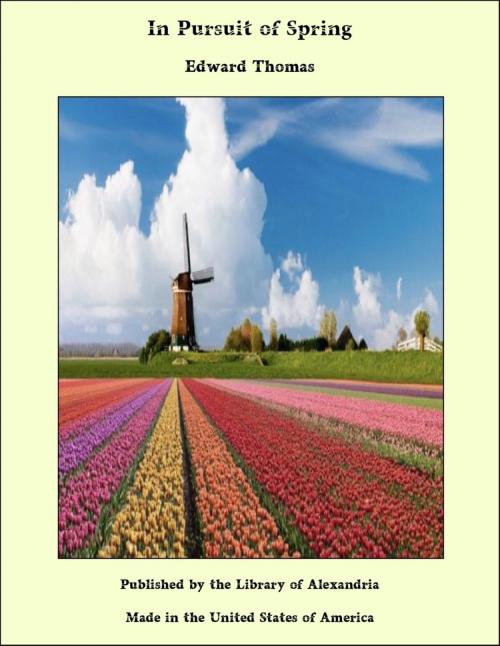| Author: | Edward Thomas | ISBN: | 9781465629623 |
| Publisher: | Library of Alexandria | Publication: | March 8, 2015 |
| Imprint: | Language: | English |
| Author: | Edward Thomas |
| ISBN: | 9781465629623 |
| Publisher: | Library of Alexandria |
| Publication: | March 8, 2015 |
| Imprint: | |
| Language: | English |
I had planned to start on March 21, and rather late than early, to give the road time for drying. The light arrived bravely and innocently enough at sunrise; too bravely, for by eight o’clock it was already abashed by a shower. There could be no doubt that either I must wait for a better day, or at the next convenient fine interval I must pretend to be deceived and set out prepared for all things. So at ten I started, with maps and sufficient clothes to replace what my waterproof could not protect from rain. The suburban by-streets already looked rideable; but they were false prophets: the main roads were very different. For example, the surface between the west end of Nightingale Lane and the top of Burntwood Lane was fit only for fancy cycling—in and out among a thousand lakes a yard wide and three inches deep. These should either have been stocked with gold-fish and aquatic plants or drained, but some time had been allowed to pass without either course being adopted. It may be that all the draining forces of the neighbourhood had been directed to emptying the ornamental pond on Wandsworth Common. Empty it was, and the sodden bed did not improve the look of the common—flat by nature, flatter by recent art. The gorse was in bloom amidst a patchwork of turf, gravel, and puddle. Terriers raced about or trifled. A flock of starlings bathed together in a puddle until scared by the dogs. A tall, stern, bald man without a hat strode earnestly in a straight line across the grass and water, as if pleasure had become a duty. He was alone on the common. In all the other residences, that form walls round the common almost on every side, hot-cross buns had proved more alluring than the rain and the south-west wind. The scene was, in fact, one more likely to be pleasing in a picture than in itself. It was tame: it was at once artificial and artless, and touched with beauty only by the strong wind and by the subdued brightness due to the rain. Its breadth and variety were sufficient for it to respond—something as Exmoor or Mousehold Heath or Cefn Bryn in Gower would have responded—to the cloudily shattered light, the threats and the deceptions, and the great sweep of the wind. But there was no one painting those cold expanses of not quite lusty grass, the hard, dull gravel, the shining puddles, the dark gold-flecked gorse, the stiff, scanty trees with black bark and sharp green buds, the comparatively venerable elms of Bolingbroke Grove, the backs and fronts of houses of no value save to their owners, and the tall chimney-stacks northwards. Perhaps only a solitary artist, or some coldish sort of gnome or angel, could have thoroughly enjoyed this moment. That it was waiting for such a one I am certain; I am almost equally certain that he could create a vogue in scenes like this one, which are only about a thousandth part as unpleasant as a cold bath, and possess, furthermore, elements of divinity lacking both to the cold bath and to the ensuing bun.
I had planned to start on March 21, and rather late than early, to give the road time for drying. The light arrived bravely and innocently enough at sunrise; too bravely, for by eight o’clock it was already abashed by a shower. There could be no doubt that either I must wait for a better day, or at the next convenient fine interval I must pretend to be deceived and set out prepared for all things. So at ten I started, with maps and sufficient clothes to replace what my waterproof could not protect from rain. The suburban by-streets already looked rideable; but they were false prophets: the main roads were very different. For example, the surface between the west end of Nightingale Lane and the top of Burntwood Lane was fit only for fancy cycling—in and out among a thousand lakes a yard wide and three inches deep. These should either have been stocked with gold-fish and aquatic plants or drained, but some time had been allowed to pass without either course being adopted. It may be that all the draining forces of the neighbourhood had been directed to emptying the ornamental pond on Wandsworth Common. Empty it was, and the sodden bed did not improve the look of the common—flat by nature, flatter by recent art. The gorse was in bloom amidst a patchwork of turf, gravel, and puddle. Terriers raced about or trifled. A flock of starlings bathed together in a puddle until scared by the dogs. A tall, stern, bald man without a hat strode earnestly in a straight line across the grass and water, as if pleasure had become a duty. He was alone on the common. In all the other residences, that form walls round the common almost on every side, hot-cross buns had proved more alluring than the rain and the south-west wind. The scene was, in fact, one more likely to be pleasing in a picture than in itself. It was tame: it was at once artificial and artless, and touched with beauty only by the strong wind and by the subdued brightness due to the rain. Its breadth and variety were sufficient for it to respond—something as Exmoor or Mousehold Heath or Cefn Bryn in Gower would have responded—to the cloudily shattered light, the threats and the deceptions, and the great sweep of the wind. But there was no one painting those cold expanses of not quite lusty grass, the hard, dull gravel, the shining puddles, the dark gold-flecked gorse, the stiff, scanty trees with black bark and sharp green buds, the comparatively venerable elms of Bolingbroke Grove, the backs and fronts of houses of no value save to their owners, and the tall chimney-stacks northwards. Perhaps only a solitary artist, or some coldish sort of gnome or angel, could have thoroughly enjoyed this moment. That it was waiting for such a one I am certain; I am almost equally certain that he could create a vogue in scenes like this one, which are only about a thousandth part as unpleasant as a cold bath, and possess, furthermore, elements of divinity lacking both to the cold bath and to the ensuing bun.















